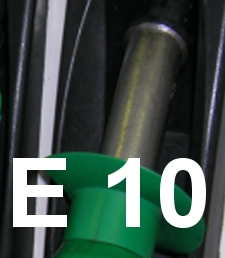| Update
on the introduction of E10 in the UK
This
report is from the latest FBHVC newsletter received today.
Posted: 130808
Back to homepage
|
 | At
the beginning of May 2013 the Federation of British Historic Vehicle Clubs ("FBHVC")
wrote to Norman Baker MP, Parliamentary under Secretary of State for Transport,
about the current requirement that petrol with an ethanol content of not more
than 5% by volume (also called 'protection grade') must remain available in the
UK, is scheduled to finish at the end of 2013. The letter stated the concerns
of the FBHVC namely there are known adverse effects when fuel containing ethanol
is used in the fuel systems of | historic
vehicles and many FBHVC member clubs have expressed concerns over these adverse
side effects. While even a 5% level of ethanol in petrol is not entirely harm-free,
it is nevertheless preferable to twice the level, as would be present in the proposed
E10 fuel.
FBHVC sought an assurance that the provision of protection grade
petrol, currently the super-grade petrol, containing not more than 5%
ethanol, will be guaranteed in the UK beyond the end of 2013.
Mr
Baker replied saying "the
industry fuel standard for petrol (EN228) has been revised and a new version has
recently been published by the British Standard Institute, which allows up to
10% ethanol content. This means that fuel suppliers are free to supply petrol
containing anything from 0-10% ethanol. Ultimately any decision to supply
E10 should not be introduced while there remain a significant number of vehicles
which may not be compatible with this new standard. I have met with and written
to fuel suppliers to encourage them to delay supplying E10 until the UK market
is ready.
With regards to the current legal requirement to supply the
protection grade - petrol with maximum 5% ethanol content (E5) - we are considering
whether this obligation should be extended beyond this year. I am minded to extend
the requirement, but my officials will let you, and other stakeholders, know when
a final decision has been taken.
Our current expectation is that E5
will - in any event - remain widely available for the foreseeable future,
regardless of a legal requirement. It is also worth noting that prior to 1988
there were no limits on maximum ethanol content and petrol containing up to 25%
ethanol was marketed in the Uk from the late 1920s to the 1960s.
I would
also like to clarify that UK legislation does not prohibit the supply of petrol
with no ethanol content. The Motor Fuel (Composition and Content) Regulations
1999 set a maximum permissible ethanol content of petrol - there is no minimum
content. It is therefore a commercial decision for suppliers whether to supply
petrol with no ethanol content.'" | |
|

